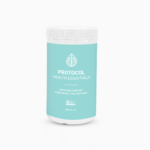I’ve been receiving many questions on Facebook and by email regarding natvia, so I thought it was time to do some research and look into this new sweetener which is being heavily marketed through the media.
What is natvia?
Natvia is a blend of erythritol and stevia.
Let’s dissect these two products.
Erythritol
Erythritol – chemically known as 2R, 3S-butane-1,2,3,4-tetraol is a sugar alcohol (although it is neither a sugar nor an alcohol) or it is also known as a polyol. Erythritol has been approved for use as a food additive (please note a food additive not a food) in the US, Australia and throughout the world. It was discovered in 1848 by British chemist John Stenhouse and occurs naturally in some fruits and fermented foods. At the industrial level, it is produced from glucose (which can come from wheat) by fermentation with a ferment such as yeast. It is 60–70 per cent as sweet as table sugar yet it is almost no caloric, does not affect blood sugar and does not cause tooth decay. It is partially absorbed by the body and excreted in urine and faeces. It is less likely to cause gastric side effects than other sugar alcohols such as xylitol, sorbitol and maltitol.
In the body, most of the erythritol is absorbed into the bloodstream in the small intestine, and then for the most part excreted unchanged in the urine (in other words it is of no use to the body). About 10 per cent enters the colon. Because 90 per cent of erythritol is absorbed before it enters the large intestine, it does not normally cause laxative effects, although extremely large doses can cause nausea as well as rumbling and gurgling in the intestine.
Erythritol has the status of generally recognized as safe (GRAS) from the FDA.
Unfortunately, erythritol is not that sweet on its own, so it’s often combined in foods and beverages with other sweeteners, sometimes artificial sweeteners like aspartame. And as is the case with natvia it is combined with stevia.
Stevia
Stevia which is used in natvia is extracted from the stevia herb or sweet leaf herb. The stevia leaf itself has a beautiful sweet taste with a note of liquorice – I grow it in my garden and enjoy it in my tea. When the stevia herb is dried and ground the main sweetening agent is mixed with all the other components of the natural plant. This has a green powder look to it if you buy it in its dry state. This is very different from what is seen in the white powder found in the grocery store and used in natvia.
The white stevia powder is a highly refined extract, blended with sugar alcohol and more often than not bulked up with maltodextrin – a refined starch often made from wheat that breaks down into glucose. To get it table-top sweet, it’s bulked out with other carbohydrates and is the case with natvia, erythritol.
In an article for the New York Times Dr Gary Taubes – one of my favourite researchers -said stevia “gets my vote as the best no caloric sweetener, by virtue of being the only one that’s truly ‘natural’… Extracts of the herb have been used as a sweetener for centuries. In Japan, stevia has been sold widely as a sugar substitute since the early 1970s without any documented ill effects.”
David Gillespie, author of Sweet Poison, is not so sure about it. In his Sweet Poison Quit Plan book, he puts stevia on the ‘your call’ list of sweeteners that he believes need more research. I agree with David here, I believe more research is needed on the extract – and its effects on human health.
Indeed, concerns have been raised intermittently about stevia over the years. It was questioned in the 1970s at the same time that sugar substitutes such as saccharin were suspected carcinogens.
The Centre for Science in the Public Interest issued a statement several years ago reporting stevia to be potentially harmful and stating it is too soon for it to be used I diet soft drinks.
Their statement goes on to say, “Shame on the Food and Drug Administration for its midnight decision to accept industry’s contention that rebaudioside A, a sweetener extracted from the herb stevia, is ‘generally recognised as safe’ or GRAS. That ‘general recognition’ of safety certainly doesn’t extend to the UCLA scientists who concluded that rebaudioside A is inadequately tested in terms of cancer and caused mutations in some laboratory tests. It is far too soon to allow this substance in the diet sodas and juice drinks consumed by millions of people. It looks like this is President Bush’s parting gift to the soda industry.”
So what do I think of natvia?
I personally won’t use natvia. Once again, it is an extract from a natural food, it does not have the other components attached to it as it would in nature. Diabetes and obesity are not due to sugar alone, it is due to a lifestyle of many bad habits rather than just consuming sugar. So I don’t believe it would help to use natvia on a regular daily basis and change nothing else. I’d like to see it on the market for at least 20 years with not one problem before I’d even consider it. Having said that, I’m very much into whole real food tested throughout evolution and natvia does not fall under this umbrella so it will probably never make it into my good books.
I do on occasion use liquid stevia. I enjoy a soda with fresh sliced lime, a few drops of liquid stevia and some fresh mint leaves. I like the liquorice taste, but it is something I have very occasionally not as a regular routine. In fact I may have had it four times in the last 12 months. I’ve had my bottle of liquid stevia in my pantry for far too long to see it as a threat to my health.
Change your taste for sweetness
Changing your taste buds would be the key; this is done by doing the rigorous loss protocol 4 Phase Fat Elimination Protocol or the Hunter Gatherer Elimination Protocol. When you do these protocols to the guidelines you will find that your taste for sweetness changes and you become more attuned to exotoxins such as MSG and fake sugars. Almonds and blueberries are sweet enough and black coffee and black tea are more interesting than sugar ladened hot drinks. You crave greens and meat more than cakes and biscuits so the need to find a sugar substitute becomes obsolete. Instead, use the old fashioned rapadura sugar, maple syrup, coconut sugar and honey when you do the occasional baking or want to make your own chocolate.
Happy Changing Habits
Cyndi O’Meara








Thank you for clarifying many questions I hade on another so called 100 % save sweetener.
I have bought Stevia about 8years ago in Cusco/ Peru at a small local market and it tasted pure and wonderful, but have never found the same taste in anther sweetener sold in our counties. Sadly I didn’t buy enough.
Hi Cyndi,
I’m a 40yr old kidney pancreas transplant patients, resulting from being diagnosed with type 1 brittle diabetes at the age of 3, leading to diabetes related renal failure, I also have a number of sideline complaints involving my peripheral and internal nervous system.
I have been a pescatarian for the past 3yrs and diary free for 23yrs, and like to try and use natural products eg essential oils, aloe Vera, herbs and herbal remedies for minor issues with my health but I am struggling to find a way to permanently cure/relieve the issue’s I have with my stomach and bowel, the bloating I regularly suffer is comparable to a woman of 8mths pregnancy!
Any helpful advice would be great.
Kind regards
Hannah Thorpe
Hi Hannah,
I would recommend you have a one on one consultation with our nutritionists to help you get to the bottom of your issues. You can find out more information here:https://changinghabits.com.au/nutritionist-consultations/
We also have many different blogs on Gut Health & even some on Bloating and tips on how to reduce it, they’re on the Changing Habits website under ‘Blogs’ if you’re interested in reading them.
Kindest regards, Admin.
Not to bother you with my personal stuff but, I am continuously scanning the net for useable information and have come across your website.
Your site is a great source of awesome and honest information, Cindy. Thank you for sharing your knowledge with the world.
Thanks for this insight as I have been a bit skeptical about Natvia. I would rather use something naturally occuring when I do the occasional baking.
I did buy Natvia yesterday and at £3.50 for a small amount of tablets is way too much. Anyway it tastes very synthetic and I will not be using them much too sweet too. Yuk is all I can say.